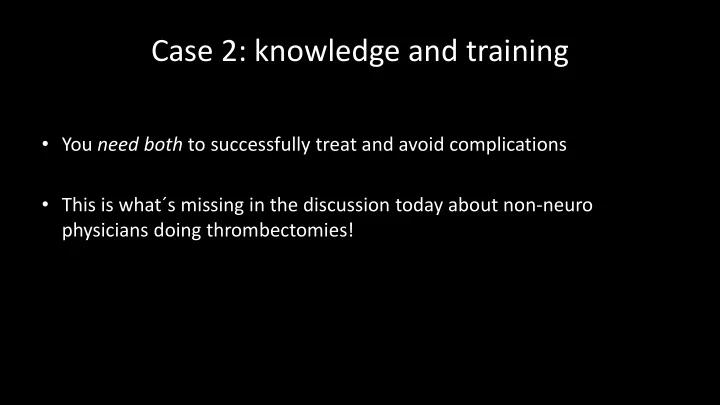

Case 2: knowledge and training • You need both to successfully treat and avoid complications • This is what´s missing in the discussion today about non-neuro physicians doing thrombectomies!
Knowledge matters! • 37 yo male • Previously healthy • Sudden L hemiparesis when biking • NIHSS score 14 • L hemisymptoms • Neglect
CTA At admittance CT CTA CTP OLEA
Treatment Device in place • M1 upper siphon occluded • Good by-pass effect • No yield from MT • Slightly improved flow Initial run After MT
Now what…? • Try again? • Change device? • Change technique? or, …use your knowledge , experience and training
Circumstantial evidence • 37 yo • No medical = cardiac history • Fluctuating flow • Good temporary by-pass effect • No yield
Intracranial dissection! Final run after 24 h CT stenting
48 h CTA
48 h MR DWI T2 FLAIR • Home after 72h • NIHSS = 1
Important! …it requires knowledge , training and experience to perform mechanical thrombectomies effectively and safely and, …you need to care for the patients properly
Knowledge • About the brain as an organ • About the intracranial circulation • About the specifics of intracranial arteries – differ a lot from systemic/cardiac arteries!
LAD MCA Muscularis Adventitia Internal elastic Collagen, stained blue
And, it´s difficult to get the training and experience • Acute patients – difficult to practice – Simulators? – Animal courses? – Need also to do other neurointerventional procedures and work in a group with experienced neurointerventionists
We should never... ...prohibit someone to help a patient with a thrombectomy...but... ...make sure that she/he has proper knowledge, training and experience...and that appropriate care for the patients is available
Recommend
More recommend